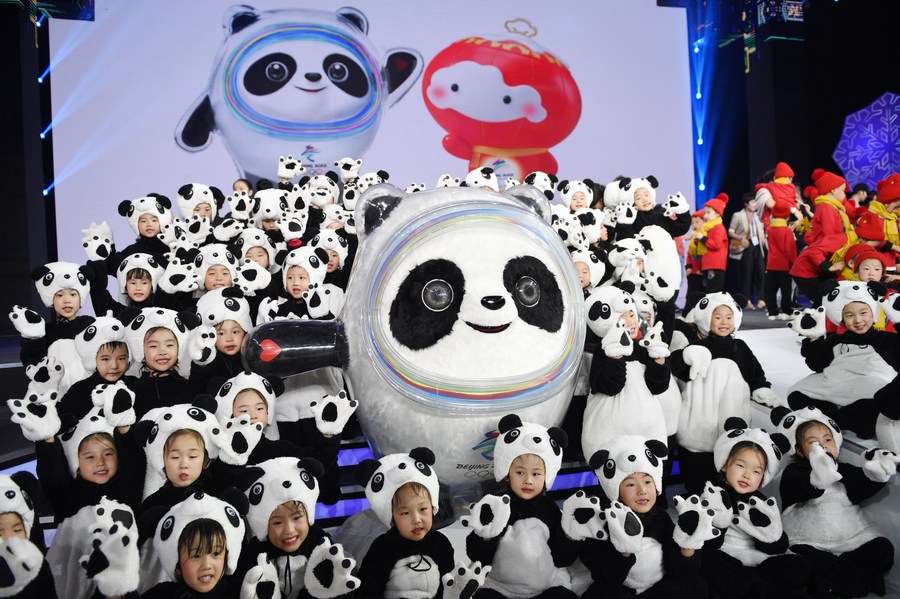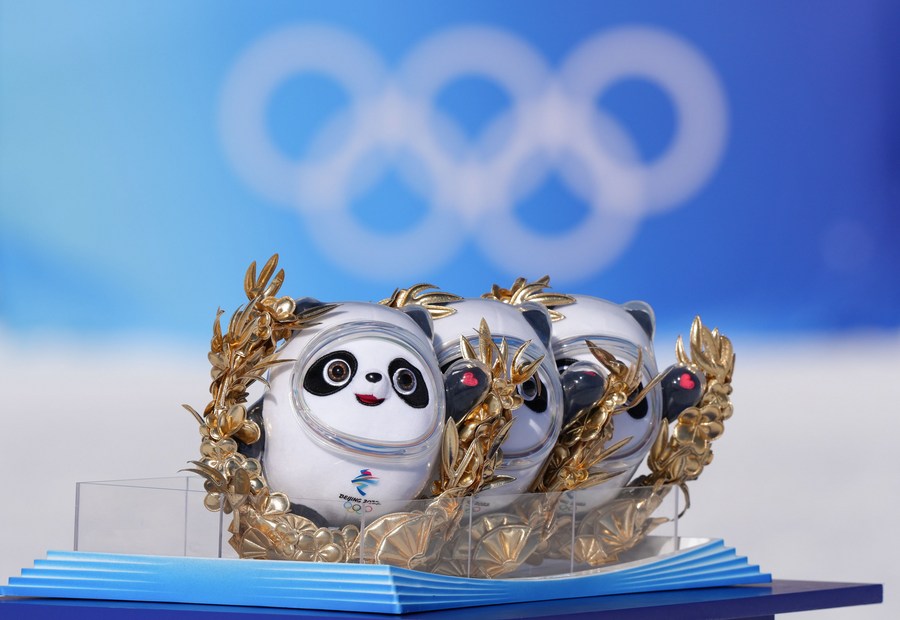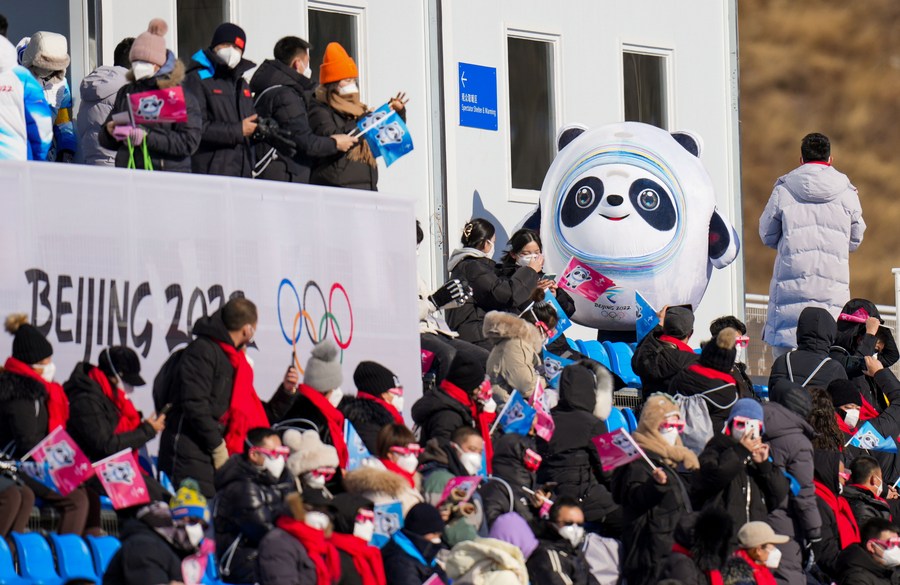
"Have you got a Bing Dwen Dwen?" Many Chinese people now tend to start a conversation with this greeting, as the panda mascot continues to be a smash hit at the ongoing Beijing 2022 Olympic Winter Games.
By Monday afternoon, topics related to the chubby giant panda cub in a hard, transparent body suit had generated 2.58 billion views on China's Twitter-like social platform Weibo, with enamored fans expressing their love and asking where they could buy the bear.

File photo taken on Dec. 27, 2019 shows children posing with Bing Dwen Dwen during the 2022 Beijing Winter Olympic and Paralympic Games mascot launch ceremony in Beijing, capital of China. (Xinhua/Ju Huanzong)
Determined to get hold of soft toys and other decorations featuring Bing Dwen Dwen, people queued for hours in cold weather outside a licensed merchandise store on commercial Wangfujing Street in downtown Beijing. Some shops have set a limit of one mascot souvenir per customer.
As the Games kicked off on Friday, over one million people flooded the official Olympics online-store on Tmall to buy Bing Dwen Dwen mascots and other merchandise, according to a report by the e-commerce giant Alibaba.
The popularity of Bing Dwen Dwen came as a surprise to Cao Xue, head of the mascot's designer team. He said that even his son has been unable to get one so far.
THE BIRTH OF A BEAR
Bing Dwen Dwen was created by a 14-person design team led by Cao from the Guangzhou Academy of Fine Arts. The bear's name connotes purity, strength and liveliness.
"It is a combination of a chubby and cute panda image with an ice shell that evokes technology," Cao said. "It looks cold at first glance, but it gives people a cute, lovely and warm feeling."

Photo taken on Feb. 6, 2022 shows the mascots of Beijing 2022 Olympic Winter Games Bing Dwen Dwen to be awarded to winning athletes of the women's snowboard slopestyle final during the flower ceremony at the Genting Snow Park in Zhangjiakou, north China's Hebei Province. (Xinhua/Xue Yubin)
However, figuring out the ideal design was by no means easy.
The initial version of the design was inspired by sugar-coated haws, a traditional Chinese snack that is popular in northern China. The sugar coating looks like a layer of ice, suggesting the world of ice-and-snow sports, Cao said.
Although the idea of sugar-coated haws was widely praised, it didn't properly convey the country's identity. The design team tried various images including deer, tigers and rabbits in an ice shell, before finally settling on the giant panda, China's national treasure, which enjoys widespread popularity around the globe.
Cao said the ultimate design was inspired by panda cubs, which are even "cuter." To observe the expressions and postures of baby pandas, Cao and his team visited the Wolong National Nature Reserve in southwest China's Sichuan Province, known as the hometown of giant pandas.
After many sleepless nights and numerous brainstorming sessions, Bing Dwen Dwen was selected from over 5,800 submissions from China and beyond.
The resulting mascot is an example of a design with uniquely Chinese characteristics, known as "guochao." However, for Cao, creating a guochao product is not a matter of simply mixing Chinese elements. "It should integrate Chinese history and culture into the DNA of the design," he said.
"Such a small panda mascot transcends national boundaries and languages," Cao said, adding that it tells Chinese stories through the Olympics and can help the world gain a better understanding of China.

Bing Dwen Dwen, the mascot of Beijing 2022 Olympic Winter Games, reacts to the audience during the Cross-Country Skiing Men's 15km + 15km Skiathlon at National Cross-Country Skiing Centre in Zhangjiakou, north China's Hebei Province, Feb. 6, 2022. (Xinhua/Liu Chan)
SUPPLIES ENSURED
"Some friends asked me where they could buy Bing Dwen Dwen," said Zhao Weidong, spokesperson for the Beijing Organizing Committee for the 2022 Olympic and Paralympic Winter Games (BOCOG). "It demonstrates the attention people are paying to the Beijing Winter Olympics, and the achievement of engaging 300 million people in winter sports in China."
Huang Wenchao, a resident of the city of Guangzhou, capital of south China's Guangdong Province, was lucky enough to purchase a Bing Dwen Dwen figurine several days ago and it now sits proudly on his desk.
"I wanted to see the Olympic Winter Games in person, but I couldn't go because of the COVID-19 epidemic. Therefore, I invited the mascot into my home, so that I could share the atmosphere."
Those who have failed to get their hands on the panda have begun making their own souvenirs to show their passion for the Games. Many have turned to online posts explaining how to draw the adorable panda, while videos demonstrating how to make steamed buns and sticky rice balls featuring Bing Dwen Dwen have also been popular.

Athletes of China (top), Italy (L, bottom) and Hungary (R, bottom) holding Bing Dwen Dwen pose for photos during the flower ceremony after the mixed team relay final of short track speed skating at the Capital Indoor Stadium in Beijing, China, Feb. 5, 2022. (Xinhua/Ju Huanzong)
Zhao said that BOCOG has arranged to increase the supply of Bing Dwen Dwen toys to meet surging demand from customers.
In the factory of Jution Silicon and Rubber (Dongguan) Co., Ltd., a Guangdong-based manufacturer of the mascot's transparent shell, people are working overtime. "I didn't expect that Bing Dwen Dwen would become so popular," said Li Yingui, founder of the company.
He said that, during the Spring Festival holiday, his company received an order for 200,000 silicone shells, which must be delivered before March 10. "I immediately came back to the factory and informed the workers to return to the production line," he added.